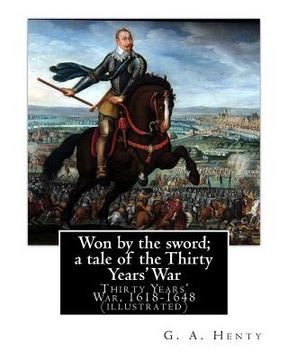Won by the sword; a tale of the Thirty Years' War. By: G. A. Henty (illustrated): Thirty Years' War, 1618-1648 (en Inglés)
Reseña del libro "Won by the sword; a tale of the Thirty Years' War. By: G. A. Henty (illustrated): Thirty Years' War, 1618-1648 (en Inglés)"
The Thirty Years' War was a series of wars in Central Europe between 1618 and 1648. It was one of the longest and most destructive conflicts in European history, resulting in millions of casualties. Initially a war between various Protestant and Catholic states in the fragmented Holy Roman Empire, it gradually developed into a more general conflict involving most of the great powers. These states employed relatively large mercenary armies, and the war became less about religion and more of a continuation of the France-Habsburg rivalry for European political pre-eminence. In the 17th century, religious beliefs and practices were a much larger influence on an average European than they are today. In the era, almost everyone was vested on one side of the dispute or another. The war began when the newly elected Holy Roman Emperor, Ferdinand II, tried to impose religious uniformity on his domains, forcing Roman Catholicism on its peoples. The northern Protestant states, angered by the violation of their rights to choose granted in the Peace of Augsburg, banded together to form the Protestant Union. Ferdinand II was a devout Roman Catholic and relatively intolerant when compared to his predecessor, Rudolf II. His policies were considered heavily pro-Catholic. These events caused widespread fears throughout northern and central Europe, and triggered the Protestant Bohemians living in the dominion of Habsburg Austria to revolt against their nominal ruler, Ferdinand II. They ousted the Habsburgs and instead elected Frederick V, Elector of Palatinate as their monarch. Frederick took the offer without the support of the union. The southern states, mainly Roman Catholic, were angered by this. Led by Bavaria, these states formed the Catholic League to expel Frederick in support of the Emperor. The Empire soon crushed this perceived rebellion in the Battle of White Mountain, but reactions of the Protestant world condemned the Emperor's action.... George Alfred Henty (8 December 1832 - 16 November 1902) was a prolific English novelist and war correspondent.He is best known for his historical adventure stories that were popular in the late 19th century. His works include The Dragon & The Raven (1886), For The Temple (1888), Under Drake's Flag (1883) and In Freedom's Cause (1885).Biography--G.A.Henty was born in Trumpington, near Cambridge. He was a sickly child who had to spend long periods in bed. During his frequent illnesses he became an avid reader and developed a wide range of interests which he carried into adulthood. He attended Westminster School, London, and later Gonville and Caius College, Cambridge, where he was a keen sportsman. He left the university early without completing his degree to volunteer for the Army Hospital Commissariat when the Crimean War began. He was sent to the Crimea and while there he witnessed the appalling conditions under which the British soldier had to fight. His letters home were filled with vivid descriptions of what he saw. His father was impressed by his letters and sent them to The Morning Advertiser newspaper which printed them. This initial writing success was a factor in Henty's later decision to accept the offer to become a special correspondent, the early name for journalists now better known as war correspondents. Shortly before resigning from the army as a captain in 1859 he married Elizabeth Finucane. The couple had four children. Elizabeth died in 1865 after a long illness and shortly after her death Henty began writing articles for the Standard newspaper. ......

